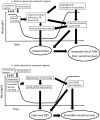Antiemetic Strategies in Patients Who Undergo Hematopoietic Stem Cell Transplantation
- PMID: 36131129
- PMCID: PMC9492824
- DOI: 10.1007/s44228-022-00012-8
Antiemetic Strategies in Patients Who Undergo Hematopoietic Stem Cell Transplantation
Abstract
Hematopoietic stem cell transplantation (HSCT) is an integral part of the treatment strategy in patients with a hematological disorder. Chemotherapy-induced nausea and vomiting (CINV) is still an issue in patients who undergo HSCT. While several guidelines for the antiemetic therapy against CINV have been published, there is no detailed information about appropriate antiemetic drugs for each conditioning regimen in HSCT. Various studies reported that the triplet of 5-HT3RA, NK1RA, and dexamethasone appears useful in HSCT. However, each antiemetic has unique adverse effects or interactions with specific drugs. Here, we review the literature relating to clinical trials on the prevention of CINV, and summarize the information to clarify the benefit of antiemetic regimens.
Keywords: Antiemetics; Hematopoietic cell transplantation.
© 2022. The Author(s).
Conflict of interest statement
The authors had no conflict of interest to declare.
Figures
References
Publication types
LinkOut - more resources
Full Text Sources


